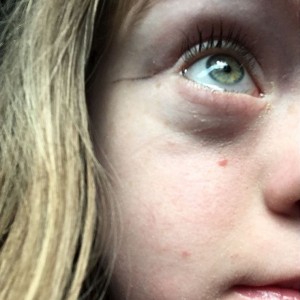Sophie and I got our nails done on Saturday. Hers never take as long as mine so after she’d finished, she parked herself at the front desk of the salon and flirted with the young man who books appointments; he helped her download Pokemon Go and they exchanged Snapchat handles. As we walked to Trader Joe’s afterward, she casually told me she sent him a message on Snapchat: “I have Down syndrome.”
I didn’t know what to say, so I just smiled and nodded.
Later, over Chinese dumplings, I asked if she’d heard back from her friend. No. She didn’t seem too concerned.
“It was a Snapchat, Mom,” she said in her best annoyed teen voice. Apparently a Snapchat does not require a response.
“So, he doesn’t know you have Down syndrome?” I asked her.
“No.”
“Oh. Who does know?”
She rattled off a list: me, her dad, her sister, her best friend since kindergarten, her nanny.
“Do your teachers know?”
“No.” She shook her head. “They don’t know.”
“How about Mrs. Wright?” I asked. Mrs. Wright is her aide.
“Yes. She knows. Tatum knows.” Tatum is her friend and classmate; she also has Down syndrome.
Eventually one of us changed the subject. It hasn’t come up again, but it’s been days and I can’t stop thinking about it.
Who knows? Who doesn’t? Does it matter? Does it matter that Sophie thinks people who do know don’t know?
Her teachers know. I’m sure of that. But — random people on the street? Do they know? Her classmates? What about the other kids at ballet class? We go days without talking about it and sometimes even I forget, for a while at least. Then the clerk at Safeway looks knowingly at Sophie and mentions that she takes care of her sister.
Sophie’s in a blurry place, moving from kid to adult (“I’m a woman!” she tells me often) but still childlike in so many ways. Maybe. Maybe not everyone notices? Children don’t, not always. Just yesterday a friend messaged me about a conversation she had with her daughter. “[We] were reading a book on Helen Keller last night, which turned into one of our many conversations about how it’s totally cool to be different. So I asked [my daughter] about Sophie, asked if she noticed anything different about her. She said yes. “Sophie could do splits in high heels.” And that was that. She also said she wants to have a playdate with Sophie and Annabelle again.”
That’s awesome — I laughed and cried — but my friend’s daughter is 6. What about the grown up world, particularly now that Sophie’s growing up?
I’ve always felt that as far as challenges go, it’s a lot easier to have something that can be definitively diagnosed. Blood test, boom, she’s got it. Okay, now what? As opposed to, well, ma’am, it appears that your kid has (fill in the blank) but we’ll never know for sure. And we don’t know what you can expect.
Now that I think about it, though, I’ve only considered it from the parent’s perspective. What about the kid?
“I don’t want to have Down syndrome,” Sophie tells me from time to time, and I can feel the weight of that label on her shoulders. She said it again on Saturday night, over those dumplings.
“What don’t you like about it?” I asked, probing a bit deeper than I have in the past.
“I don’t know,” she said, dipping her head shyly.
“Does it make school harder?”
“Yes.”
“Does it make it harder to make friends?”
“No, that’s easier.”
That answer took my breath away. So matter of fact and so freaking deep — she realizes on some level that it’s easier for her to talk to people because the composition of each cell that makes up her being is different from mine. “It doesn’t make it easier for her to keep friends,” Ray said when I told him about it later. He’s right.
Sophie does not want to be defined by her diagnosis. I know that, we’ve talked about it. And yet she’s sharing it with people she meets. This is new, obviously a developmental stage, and one that has thrown me off balance.
Luckily, I’ve learned to let Sophie be my guide.
(Photo credit: Sophie.)
Amy’s book, “My Heart Can’t Even Believe It: A Story of Science, Love, and Down Syndrome,” was published by Woodbine House this spring and is available through Amazon and Changing Hands Bookstore. For information about tour dates and other events visit myheartcantevenbelieveit.com and here’s a book trailer.
